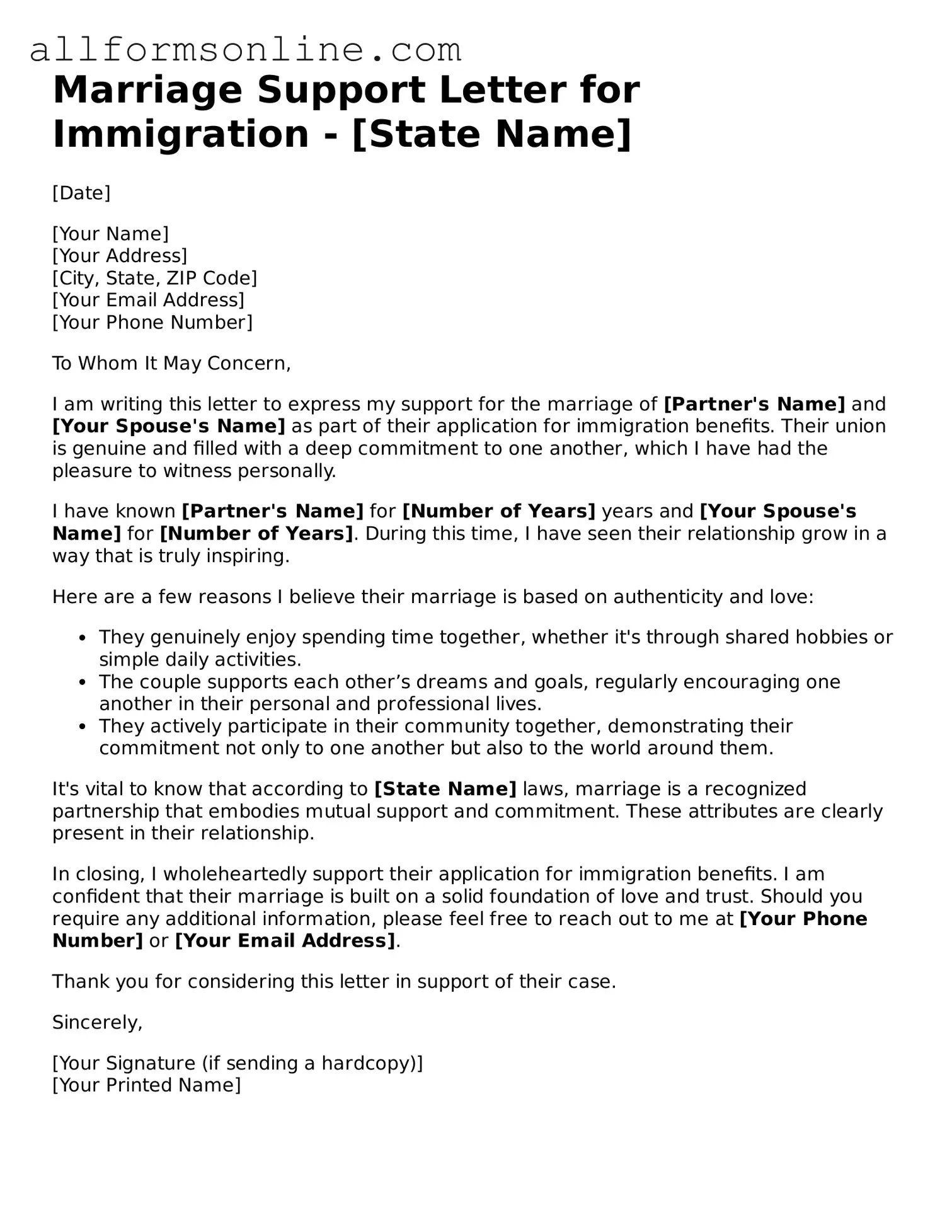Blank Marriage Support Letter for Immigration Form
Misconceptions
-
Misconception 1: The Marriage Support Letter is not necessary for immigration applications.
Many people believe that a Marriage Support Letter is optional. In reality, this letter can significantly strengthen an immigration application by providing personal evidence of a genuine marriage.
-
Misconception 2: Anyone can write the Marriage Support Letter.
While friends and family can provide letters of support, the primary letter should come from the spouse. This letter should reflect the couple's relationship and intentions, making it more credible.
-
Misconception 3: The letter must follow a strict format.
There is no rigid format for the Marriage Support Letter. However, it should include key details about the relationship, such as how the couple met and their future plans. A personal touch is essential.
-
Misconception 4: The letter should only focus on the marriage itself.
Some believe the letter should solely discuss the marriage. In truth, it should also highlight the couple's shared experiences, challenges, and the emotional aspects of their relationship.
-
Misconception 5: A Marriage Support Letter guarantees approval of the immigration application.
While a well-crafted letter can enhance an application, it does not guarantee approval. Immigration authorities consider multiple factors, and the letter is just one piece of the puzzle.
What to Know About This Form
What is a Marriage Support Letter for Immigration?
A Marriage Support Letter for Immigration is a document that provides evidence of a genuine marriage between a U.S. citizen or lawful permanent resident and their foreign spouse. This letter is often submitted as part of the immigration application process to demonstrate that the marriage is legitimate and not solely for immigration benefits. It typically includes personal anecdotes, details about the couple's relationship, and any relevant supporting information.
Who should write the Marriage Support Letter?
The letter can be written by the U.S. citizen or lawful permanent resident spouse, but it can also be beneficial for friends or family members to provide their perspectives. These individuals can attest to the couple's relationship and provide additional context about their interactions and experiences together. It is important that the letter reflects genuine sentiments and observations.
What should be included in the Marriage Support Letter?
The letter should include specific details about the couple’s relationship, such as how they met, significant milestones, and shared experiences. It should also express the writer's belief in the authenticity of the marriage. Including personal stories, photographs, and other evidence can strengthen the letter's impact. Additionally, the writer should include their contact information and relationship to the couple.
How long should the Marriage Support Letter be?
There is no strict length requirement for the letter, but it should be long enough to convey meaningful information without being overly lengthy. A well-structured letter of one to two pages is typically sufficient. It is important to be concise while ensuring that all relevant details are included to support the couple’s case.
Is it necessary to notarize the Marriage Support Letter?
Notarization of the Marriage Support Letter is not a requirement, but it can add an extra layer of credibility. If the letter is notarized, it shows that the writer has affirmed the truthfulness of the content under oath. However, many immigration applications are accepted without notarized letters, so it is not mandatory.
Popular Marriage Support Letter for Immigration Types:
Citizenship Friend Character Reference Letter for Immigration - This reference discusses the applicant's outstanding interpersonal skills and their ability to connect with diverse groups of people.
A Recommendation Letter form serves as a professional document designed to endorse an individual's skills, achievements, and character qualities. It plays a pivotal role during the application process for jobs, educational programs, or special opportunities. This form channels the insights of a recommender into a structured format, providing recipients with a comprehensive understanding of the candidate's potential, which can be facilitated by using the Recommendation Letter form.
Family Member Eagle Scout Recommendation Letter From Parent - He exemplifies the values of the Scout Oath and Law through his actions and character.
How to Use Marriage Support Letter for Immigration
Completing the Marriage Support Letter for Immigration form is an important step in the immigration process. This letter serves as a testament to the authenticity of your marriage and can significantly impact the outcome of your application. Follow these steps carefully to ensure that you provide all necessary information accurately.
- Begin by gathering all required information, including your personal details and those of your spouse.
- Clearly state your full name, address, and contact information at the top of the letter.
- Include your spouse’s full name and their contact information below yours.
- Write a brief introduction explaining your relationship, including how long you have been together and how you met.
- Detail your marriage, including the date and location of your wedding.
- Discuss your life together, mentioning shared experiences, future plans, and any children, if applicable.
- Affirm the legitimacy of your marriage by expressing your commitment to each other.
- Conclude the letter with your signature and the date.
After completing the form, make sure to review it for any errors or missing information. Submitting a well-prepared letter can strengthen your immigration application and help clarify the authenticity of your relationship.
